Ribbon Cutting at Chilileka Basic School's New Library
Missing a little context? Jump to the bottom to learn more about why I'm in Zambia this week.
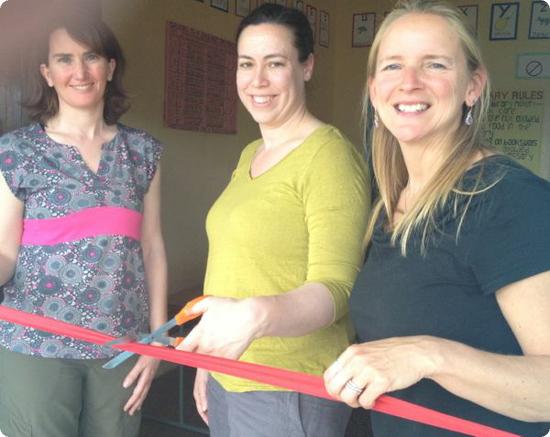
I may have helped organize the Passports with Purpose fundraiser, but it was the work of about two thousand people (between bloggers, donors and corporate sponsors) who really built this project. So to load myself into a car, ride about 90 minutes outside Lusaka, and be greeted with such overwhelming enthusiasm felt a little bit like stealing someone else's glory. Here's my best effort to capture the feeling of that day so that you can enjoy your fair share.
----
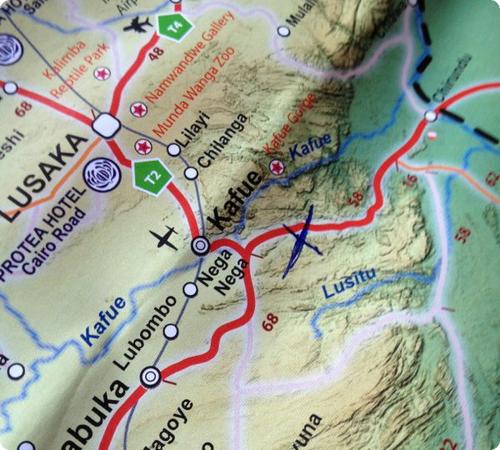
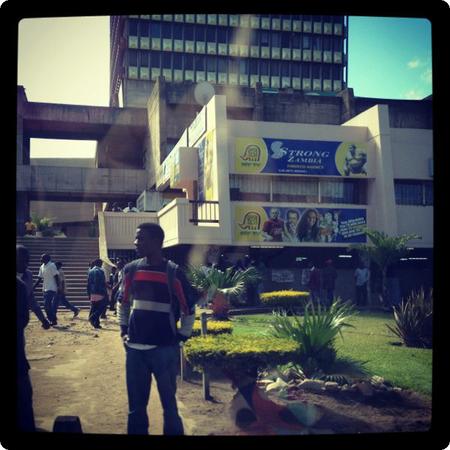
But as we left the city, our energy started to mellow, and there was a chance to reflect on what it meant to build a library in Zambia. Our township tour the day before had deeply touched me. The kids we met in Lusaka's slums really had nothing. Even fewer services reach kids in the country. Access to clean water, shelter, food and medical care are much needed fundamentals. Still, for the kids who survive childhood, an education is the only way to rise out of the hand-to-mouth cycle lived out by their parents - and for that, they need books. It's impossible to become truly literate when you learn to read from a blackboard.
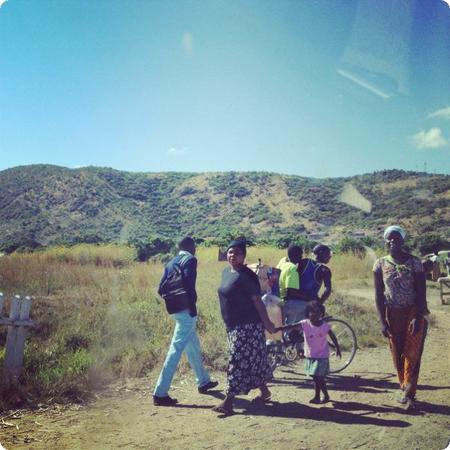
Michelle, Beth and I really didn't know what to expect from this visit. It's hard to get a handle on a country like Zambia in advance. Even in the age of the Internet, there are few pictures outside of the tourist areas and guidebooks don't paint a clear picture of what a rural school might look like.
And what about the students and teachers, would they see our visit as an intrusion? a welcome distraction?something else? As the city dropped away, I wondered about that too, but as we drew closer to the school, there were cell phone calls between the school and our Room to Read escorts. Clearly something was afoot. The buzz that had faded as we left the city picked up again, and we readied ourselves to greet the students.
In what felt like a thoroughly African welcome, we were greeted with drums as community members and students danced the traditional "War Welcome Dance" for this area. We poured out of the car, eager to be in the center of it all, and eager to see the library that you helped build.
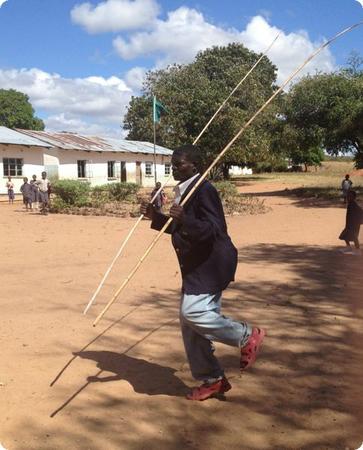
Frankly it was overwhelming. In a good way. We shook hands with the teachers and community members who had lined up to greet us and were escorted into the headmaster's office where we learned a little about the history of the school and the community effort that had gone into the library (Community members contributed 25% of the building cost in the form of labor and locally sourced materials like sand or rocks.)
And then we streamed into the library itself. As we approached the door, the kids burst into a welcome song. I wish I could do this moment justice. The sunlight streaming in through the windows behind them, the voices that completely filled the room, and the warmth of yellow library walls and the hand-drawn pictures that decorated them. Beth, Michelle and I hovered in the doorway taking it all in, eyes brimming over with tears. The effort to raise the money, to arrange this trip, and to travel so far from home all worth it for this one moment.
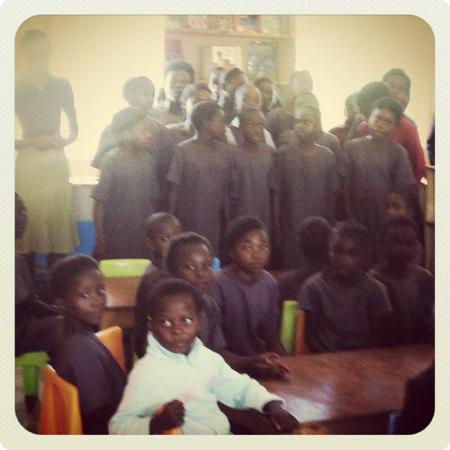
I could have lived in that song forever, but eventually it ended and we found our seats. A nervous energy took over as one of the teachers announced that the students would be showing off some the skills practice the library is used for.
We just loved watching the kids push themselves through the program. It's true that they were nervous, but they were excited too. And as I sat there wondering how much of this was rehearsed, I realized it didn't matter. With my own kids, one of the most important tools I have is to show them how much I value their education. The fact that the community leaders, including the village headman, had come out for this event. The fact that we had flown in all the way from Seattle to witness their reading. The fact that we brought along postcards from so many donors. And the fact that you had contributed so much money to give these kids a place to learn sends a strong signal about how much value we all place on their education - and that's a message that I hope will stick with the kids in the Chilileka Basic School long after we've flown home.
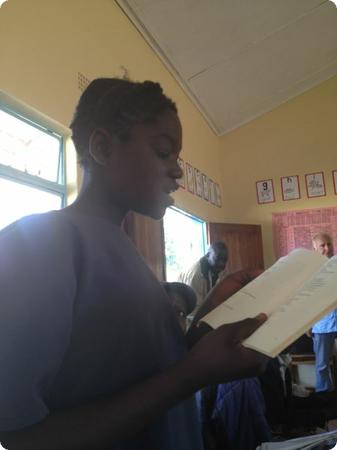
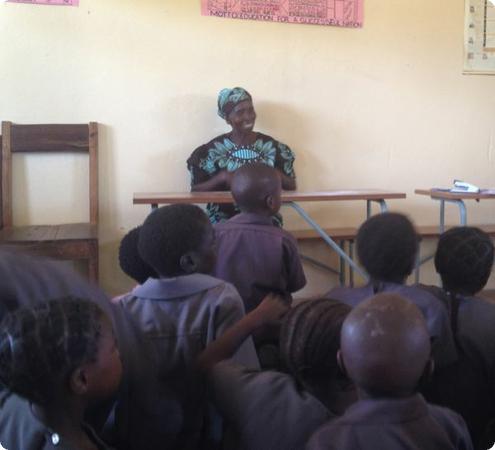
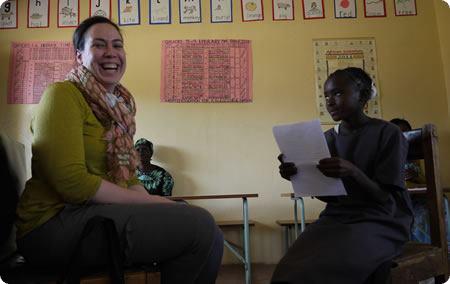
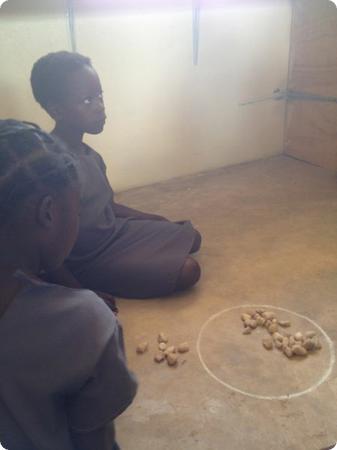
And here's the message I hope will stick with you. YOU did this. Your contribution made an immeasurable difference in the livest of the 300+ students who attend the Chilileka Basic School and the countless children who will follow them.
I'm a co-founder of an annual travel bloggers fundraiser called Passports with Purpose that raised $90,000 last winter to build two libraries in Zambia. The libraries, built by Room to Read are now complete. Co-founders Beth Whitman, Michelle Duffy and I flew all the way to Zambia from our homes in Seattle to learn more about the kids being helped. Pam Mandel and Meg Paynor couldn't quite make the trip work with their schedules, and we missed their warmth and humor on this trip.
We owe a huge "Thank You" to Expedia who not only sponsored our airfare and hotel stays, but also helped us work through scheduling and local arrangements that proved to be more tricky than we'd originally envisioned.
Got Questions about the library, Zambia or Room to Read? Ask them in comments and I'll do my best to answer.
6 comments |
Posted on May 14, 2012 |
 Save to del.icio.us
Save to del.icio.us


Comments
Colleen Lanin on May 14, 2012 at 12:24 p.m.
Wiping away tears so I can write this...thank you for sharing your experience in Zambia. What an incredible event - it is surely something that will live with you always. I am so proud to have participated in some small way to the building of these libraries. We are making the world a better place, one book at a time, one person at a time.
Sonja on May 14, 2012 at 2:33 p.m.
I'm so enjoying your posts on Zambia. Thank you.
Barbara on May 14, 2012 at 3:45 p.m.
This is beautiful work. Thanks so much for sharing this!!!
Kara Williams on May 14, 2012 at 4:18 p.m.
Do you have a photo of the postcards that you received? If you posted one, I might have missed it!
Thank you SO much for sharing!!
Debbie on May 15, 2012 at 3:12 a.m.
Thank you everyone for your notes - I'm so glad that you enjoyed reading about the visit.
Kara, YES we do have pictures of the postcards themselves - I was the person who handed them over, so I didn't have a picture of that, but I'm working on getting one. We gave the postcards to the headmaster at the very end of the program, as everyone was saying thank you. We had put them into a little book with plastic covers so that they'll hold up for a long time (the kids can still remove them to read the writing on the back). The teachers and the students were super enthusiastic about the postcards, and it was such a nice way for us to feel like we'd connected the dots between donors and the kids.
Jessica on May 15, 2012 at 3:05 p.m.
What a great chapter in this inspiring story!